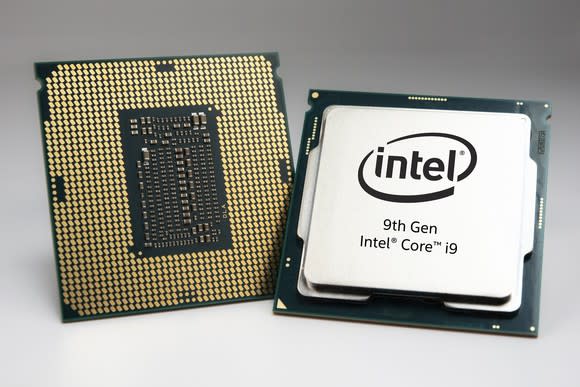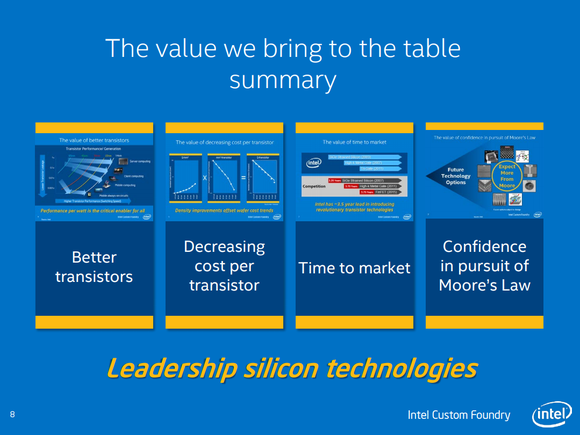Intel May Have Finally Pulled the Plug on This Boondoggle
It's been eight years since chip giant Intel (NASDAQ: INTC) established its contract chip manufacturing division, known as Intel Custom Foundry (ICF).
In that time, this business has failed to gain meaningful traction -- something that's evident in the fact that Intel doesn't even bother to report revenue and profit results for that segment. Sure, the company has made a lot of noise about a few relatively small deals. It even managed to get programmable logic maker Altera to sign on as a customer (although Intel bought Altera before those first products ever shipped). But in general, ICF hasn't delivered value to shareholders.

Image source: Intel.
That's why it didn't surprise me when Daniel Nenni with semiconductor-focused website SemiWiki reported on Dec. 17 that Intel had pulled the plug on ICF. (The author said that this was "verified through multiple sources.")
Of course, Intel declined to comment, but I think the odds that this report is accurate are extremely good. Here's why.
Would you trust Intel to build your chips?
Back in 2014, Sunit Rikhi, who at the time led ICF, presented a slide that said ICF's value proposition was "[leadership] silicon technologies." In that slide deck, Intel boasted that it had a roughly "3.5 year lead in introducing revolutionary transistor technologies," along with some other claims that I'll let you see for yourself in the slide below:

Image source: Intel.
Unfortunately for Intel and ICF, the company stumbled with the introduction of its 14nm technology, and its 10nm technology is so delayed that it still isn't in mass production today. The company has told investors to expect the first systems based on chips manufactured using that technology to be on shelves for the "holiday selling season" in 2019.
Intel's main competitor in leading-edge chip manufacturing technologies -- Taiwan Semiconductor Manufacturing Company (NYSE: TSM), or TSMC -- has already managed to put its 10nm technology (which, by Intel's admission, provides better chip density than its own 14nm technology) as well as the follow-on to that, known as 7nm, into mass production.
Ask yourself this: If you were the head of a company that needed to pick a manufacturing partner for your latest chip design, would you pick the company that doesn't have a solid track record of building other companies' chips for them, and has struggled mightily to get its latest chip manufacturing technology into mass production? Or would you choose the company that generates tens of billions of dollars each year from building other companies' designs and, for good measure, has been executing well in bringing new manufacturing technologies to market in recent years?
If it were my business on the line, I know which one I'd pick -- and it wouldn't be Intel.
It's no longer needed
Another thing to keep in mind is that, according to Intel, the total addressable market (TAM) that it's going after with its own internally-designed products is quite significant. Indeed, in a recent editorial, Intel said it is now "competing to win in an estimated $300 billion total addressable market for silicon -- making a more diverse array of products at ever-higher volumes for a broader set of customers."
I've written about some of my issues with that TAM number in the past. For example, Intel counts the entirety of the mobile applications market as part of this figure, even though it can only address a relatively small portion of that figure with its current product offerings. However, the point is that Intel probably thinks there's enough room for it to grow by selling its own products that trying to build other companies' products just isn't as attractive as it might have been in 2012 or 2013 -- years during which the chip giant suffered modest revenue declines.
Investor takeaway
If it's true that Intel has pulled the plug on ICF, then that's probably the right move for the chip giant. Intel seems better off focusing its considerable resources on building its own products intended to go after what it says is a $300 billion total addressable market: a significant multiple of the $71.2 billion in sales that the company expects to rake in during 2018.
More From The Motley Fool
Ashraf Eassa has no position in any of the stocks mentioned. The Motley Fool has no position in any of the stocks mentioned. The Motley Fool has a disclosure policy.

 Yahoo Finance
Yahoo Finance 